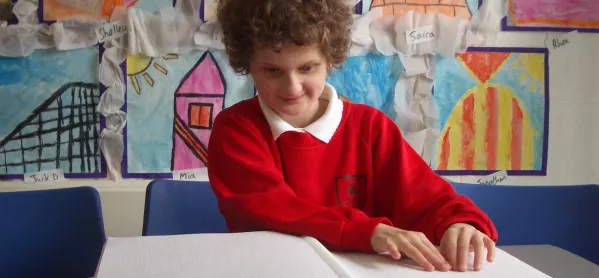One in 50 children and young people in Scotland with no additional support needs (ASN) leaves school without a single qualification at National 4 level and above. Alarmingly, this number rises to one in five for children and young people with a visual impairment.
Sight loss does not limit a child’s capacity to learn. But inaccessible learning, restricted support with habilitation - the teaching and learning of daily living skills with increasing independence - and exclusion from non-academic subjects and extracurricular activities can.
Many parents and pupils have told us that visual impairment puts barriers in the way of the things that children and young people want to do with their lives.
Any pupil looking to enter a graduate-level career needs support to access subjects and achieve qualifications to at least Higher level in their chosen areas. But only four in 10 pupils with sight loss achieve at least one Higher, compared with seven in 10 of their peers with no additional support needs - a significant attainment gap.
National special schools: The battle to fill places
Long read: When visually impaired pupils need a helping hand
Short read: Call to change ‘crazy’ funding of special schools
Figures: Additional support needs: key statistics
Like any university applicant, they would also benefit from taking part in extracurricular activities and work experience. But these are often unnecessarily inaccessible, putting them at a disadvantage. Pupils with a visual impairment also have to work harder to pick up independent living skills in order to leave home. This also applies to college, apprenticeships and moving straight into work.
Support for visually impaired pupils
Qualified teachers of children and young people with a vision impairment (QTVIs) provide vital support. Without them, pupils would not have the opportunity to learn Braille; they wouldn’t have someone who can understand their needs and suggest ways to meet them; and class teachers would not get advice on how to adapt their lessons to fully include pupils with sight loss.
However, although the number of pupils with sight loss is increasing, the number of QTVIs is not rising to meet it. In some areas, this means less contact time per pupil and less support for these students to get as much out of learning as their sighted peers.
As well as support to access the curriculum, it is important that pupils receive adequate habilitation support in order to develop independent living and socialisation skills and, in turn, confidence. We know of young people with the grades to get into university and college who have had to defer a year in order to catch-up on basic habilitation like learning how to live independently. These skills are much harder to develop with sight loss, but just as important as academic learning.
Visually impaired children and young people can - and do - thrive in mainstream education. But it is vital that every child receives the support they need.
We are asking the Scottish government to put in place a 10-year strategy to close the sensory impairment attainment gap. It must address why a blind or partially sighted child is 10 times more likely not to achieve a single National 4 or Higher than their sighted peers.
Anne-Marie Fleming works for the Royal National Institute of Blind People (RNIB) Scotland. She is education, CYPF (children, young people and families) and transitions lead, and a QTVI (qualified teacher of children and young people with a vision impairment)
